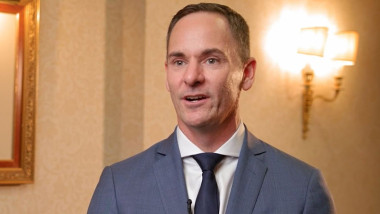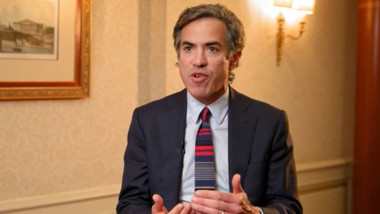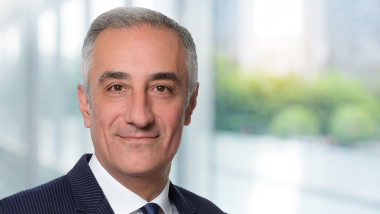3 Lessons on Artificial Intelligence
According to our latest survey of institutional investors, most associate AI with a future that is depicted more accurately in the film Moneyball (50%) rather than Terminator (6%), saying it’s just a new tool for analyzing data rather than a key opening the door to a dystopian future. Yet 35% also define AI in terms of the film War Games, worrying a hacker could set off geopolitical, economic, or social turmoil.
Techno-optimists and doomsayers came together recently during the Artificial Intelligence Symposium organized by Thematics AM on Wednesday, 29 November 2023 at the George V Hotel in Paris. Here are three key observations from the thought leaders who took to the stage:
1. Artificial Intelligence must be regulated
Dr. Luc Julia, Chief Scientific Officer at Renault, co-creator of Siri and author of "L'intelligence artificielle n'existe pas" (2019)
Artificial Intelligence (AI) inspires hope, fear and fascination. Is it a source of investment opportunities and productivity gains? Will it destroy jobs? Is uncontrolled super-intelligent AI a threat to humanity?
Given the risks and threats that AI poses to our lives, it needs to be regulated. At least, that's what Luc Julia thinks.
However, we need to position the cursor carefully and regulate with discernment, so as not to restrict innovation unnecessarily. The use of data for algorithms raises the question of data governance and the intellectual property of personal data. Yet it would be a pity to put the brakes on any AI progress in the name of a hypothetical potential danger.
According to Luc Julia, AI is not good or bad in itself. It's all a question of how we use it: it has to be used wisely. Facial recognition, for example, can be used for strong authentication by a bank, or by a dictatorship to control its population.
And while the potential dangers of AI are undeniable, so are the benefits. AI has many applications in the business world: creating new goods and services, automating repetitive tasks, predicting breakdowns in machines, sorting CVs in HR departments. In the field of medicine, applications in radiology, for example, can help radiologists refine their diagnoses.
Meanwhile, examples of progress made possible by AI are legion in transport, home automation and smart cities. AI can make life easier and save lives. In short, when regulating, we must not throw the baby out with the bathwater.
2. By delegating decision-making to the machine, we run the risk of becoming one
Gaspard Koenig, Philosopher, politician, columnist for Les Echos, essayist and novelist, author of "La fin de l'individu. Voyage d'un philosophe au pays de l'intelligence artificielle"
Can AI dehumanize us? This is the question indirectly posed by Gaspard Koenig. Human beings are distinguished from machines by their cognitive autonomy, their ability to make judgments and choices. Free will is the foundation of liberal societies.
To delegate our decision-making to machines is to atrophy our ability to decide and de facto renounce our freedom, like the Uber driver who blindly follows Google Maps without questioning the relevance of the proposed route. By delegating decision-making to the machine, we run the risk of becoming one. “When we give up making decisions about small things, we run the risk of no longer being able to make them about big things," warns Koenig.
Essentially, the development of AI can hinder our freedom. Our thinking and our ability to argue must not be abandoned to a machine, especially as AI can be misused to influence us through nudge techniques, based on the principle that man is not autonomous in his decision-making. Man must keep a critical eye on technology and avoid techno-beatitude.
3. The limiting factor for growing French technology companies is capital
Philippe Tibi is Chairman of the Executive Committee and Technical Committees of the ’scale-up financing’ project at the Ministry of the Economy, Finance and Recovery; Vice-Chairman of the Supervisory Board of the Fonds de Réserve pour les retraites; and Professor of Finance at the Ecole Polytechnique and Sciences Po)
A report submitted to the French Ministry of Economy and Finance in July 2019 by Philippe Tibi drew attention to the insufficient financing capacity of technology companies in France at the time of their industrial and commercial acceleration, or‘late stage’.1
Following this report, an initiative to support French Tech bearing his name was launched by the French Ministry of the Economy and Finance. A group of French institutional investors, including insurers, made a commitment to the French government to allocate part of their investments (€6 billion) to financing French technology companies via unlisted (late-stage innovation capital funds) and listed (Global Tech) funds managed in France.
Three years after the launch of the Tibi initiative, the results are positive, with 45 venture capital funds managing €16 billion, 3 of which have assets in excess of €1 billion. The government now wants to go even further and speed things up.
For Philippe Tibi, the main factor limiting the growth of French technology companies is capital. American and Chinese start-ups benefit from access to financing of unparalleled depth through venture capital funds.
"In the United States last year, over 100 companies raised over $100 million," he said.
Unable to find adequate financing, French technology companies of modest size in the late-stage phase opt either for an IPO, sometimes prematurely, in France or abroad, or for a sale to a competitor, or turn to a foreign innovation capital fund for which the amount of funds raised will not be a hindrance.
Written on 18 December 2023.
1 Source: https://www.economie.gouv.fr/rapport-philippe-tibi-financement-des-entreprises-technologiques-francaises
The provision of this material and/or reference to specific securities, sectors, or markets within this material does not constitute investment advice, or a recommendation or an offer to buy or to sell any security, or an offer of any regulated financial activity. Investors should consider the investment objectives, risks and expenses of any investment carefully before investing. The analyses, opinions, and certain of the investment themes and processes referenced herein represent the views of the portfolio manager(s) as of the date indicated. These, as well as the portfolio holdings and characteristics shown, are subject to change. There can be no assurance that developments will transpire as may be forecasted in this material. The analyses and opinions expressed by external third parties are independent and does not necessarily reflect those of Natixis Investment Managers. Past performance information presented is not indicative of future performance.
Techno-optimists and doomsayers came together recently during the Artificial Intelligence Symposium organized by Thematics AM on Wednesday, 29 November 2023 at the George V Hotel in Paris. Here are three key observations from the thought leaders who took to the stage:
1. Artificial Intelligence must be regulated
Dr. Luc Julia, Chief Scientific Officer at Renault, co-creator of Siri and author of "L'intelligence artificielle n'existe pas" (2019)
Artificial Intelligence (AI) inspires hope, fear and fascination. Is it a source of investment opportunities and productivity gains? Will it destroy jobs? Is uncontrolled super-intelligent AI a threat to humanity?
Given the risks and threats that AI poses to our lives, it needs to be regulated. At least, that's what Luc Julia thinks.
However, we need to position the cursor carefully and regulate with discernment, so as not to restrict innovation unnecessarily. The use of data for algorithms raises the question of data governance and the intellectual property of personal data. Yet it would be a pity to put the brakes on any AI progress in the name of a hypothetical potential danger.
According to Luc Julia, AI is not good or bad in itself. It's all a question of how we use it: it has to be used wisely. Facial recognition, for example, can be used for strong authentication by a bank, or by a dictatorship to control its population.
And while the potential dangers of AI are undeniable, so are the benefits. AI has many applications in the business world: creating new goods and services, automating repetitive tasks, predicting breakdowns in machines, sorting CVs in HR departments. In the field of medicine, applications in radiology, for example, can help radiologists refine their diagnoses.
Meanwhile, examples of progress made possible by AI are legion in transport, home automation and smart cities. AI can make life easier and save lives. In short, when regulating, we must not throw the baby out with the bathwater.
2. By delegating decision-making to the machine, we run the risk of becoming one
Gaspard Koenig, Philosopher, politician, columnist for Les Echos, essayist and novelist, author of "La fin de l'individu. Voyage d'un philosophe au pays de l'intelligence artificielle"
Can AI dehumanize us? This is the question indirectly posed by Gaspard Koenig. Human beings are distinguished from machines by their cognitive autonomy, their ability to make judgments and choices. Free will is the foundation of liberal societies.
To delegate our decision-making to machines is to atrophy our ability to decide and de facto renounce our freedom, like the Uber driver who blindly follows Google Maps without questioning the relevance of the proposed route. By delegating decision-making to the machine, we run the risk of becoming one. “When we give up making decisions about small things, we run the risk of no longer being able to make them about big things," warns Koenig.
Essentially, the development of AI can hinder our freedom. Our thinking and our ability to argue must not be abandoned to a machine, especially as AI can be misused to influence us through nudge techniques, based on the principle that man is not autonomous in his decision-making. Man must keep a critical eye on technology and avoid techno-beatitude.
3. The limiting factor for growing French technology companies is capital
Philippe Tibi is Chairman of the Executive Committee and Technical Committees of the ’scale-up financing’ project at the Ministry of the Economy, Finance and Recovery; Vice-Chairman of the Supervisory Board of the Fonds de Réserve pour les retraites; and Professor of Finance at the Ecole Polytechnique and Sciences Po)
A report submitted to the French Ministry of Economy and Finance in July 2019 by Philippe Tibi drew attention to the insufficient financing capacity of technology companies in France at the time of their industrial and commercial acceleration, or‘late stage’.1
Following this report, an initiative to support French Tech bearing his name was launched by the French Ministry of the Economy and Finance. A group of French institutional investors, including insurers, made a commitment to the French government to allocate part of their investments (€6 billion) to financing French technology companies via unlisted (late-stage innovation capital funds) and listed (Global Tech) funds managed in France.
Three years after the launch of the Tibi initiative, the results are positive, with 45 venture capital funds managing €16 billion, 3 of which have assets in excess of €1 billion. The government now wants to go even further and speed things up.
For Philippe Tibi, the main factor limiting the growth of French technology companies is capital. American and Chinese start-ups benefit from access to financing of unparalleled depth through venture capital funds.
"In the United States last year, over 100 companies raised over $100 million," he said.
Unable to find adequate financing, French technology companies of modest size in the late-stage phase opt either for an IPO, sometimes prematurely, in France or abroad, or for a sale to a competitor, or turn to a foreign innovation capital fund for which the amount of funds raised will not be a hindrance.
Written on 18 December 2023.
The provision of this material and/or reference to specific securities, sectors, or markets within this material does not constitute investment advice, or a recommendation or an offer to buy or to sell any security, or an offer of any regulated financial activity. Investors should consider the investment objectives, risks and expenses of any investment carefully before investing. The analyses, opinions, and certain of the investment themes and processes referenced herein represent the views of the portfolio manager(s) as of the date indicated. These, as well as the portfolio holdings and characteristics shown, are subject to change. There can be no assurance that developments will transpire as may be forecasted in this material. The analyses and opinions expressed by external third parties are independent and does not necessarily reflect those of Natixis Investment Managers. Past performance information presented is not indicative of future performance.




 Private assets: Is regulation a brake or an accelerator?
Private assets: Is regulation a brake or an accelerator?


